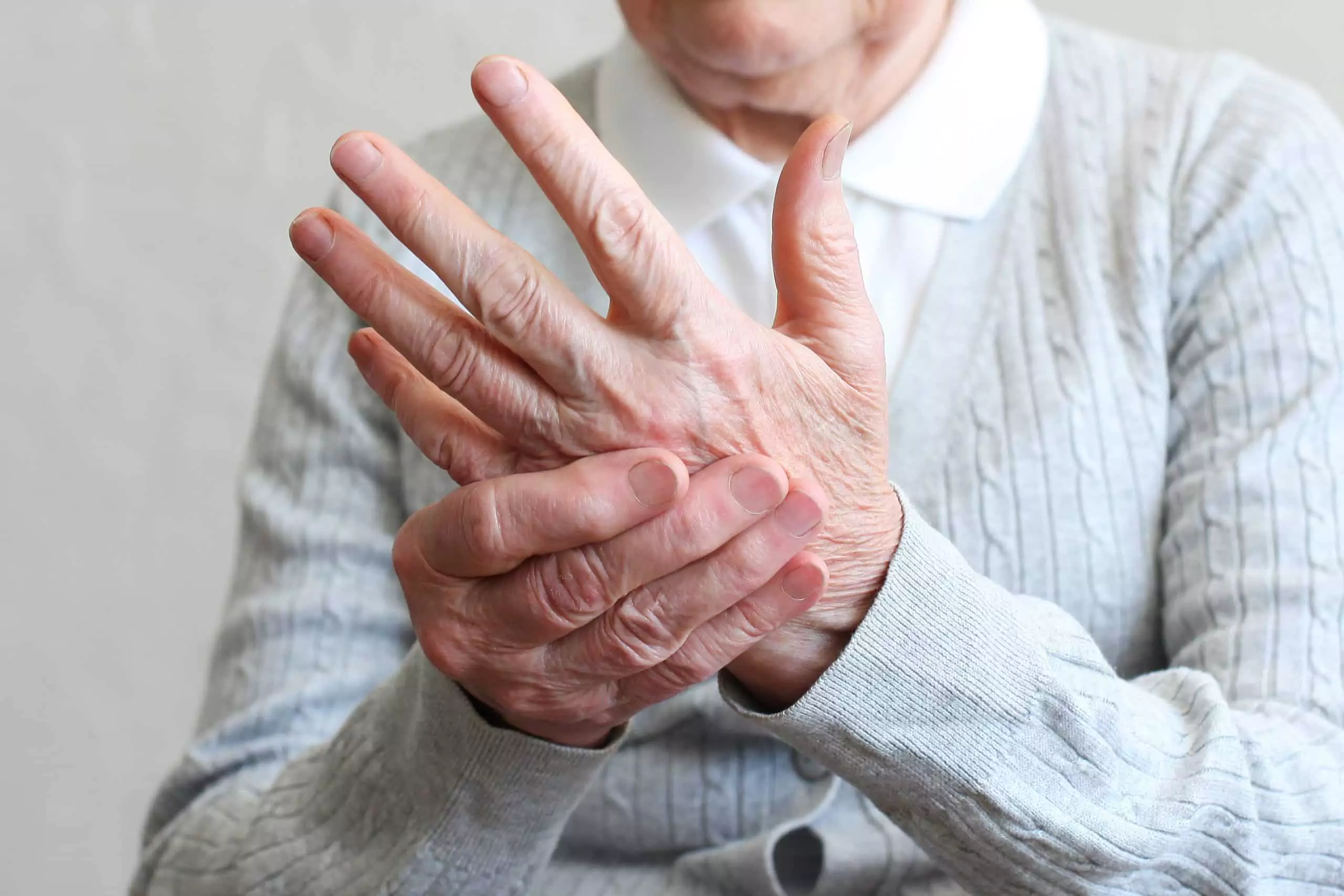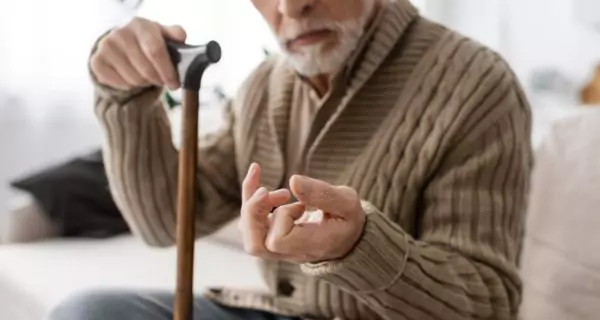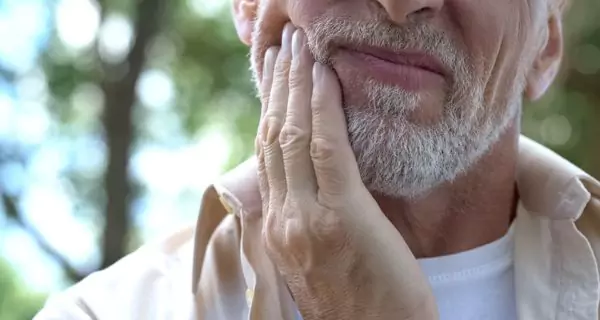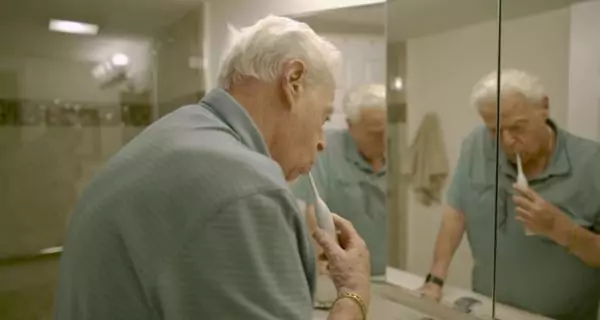Last Updated on: 27th December 2025, 07:03 am
Those living with Parkinson’s disease face a particular challenge in performing proper oral hygiene, primarily due to a characteristic symptom known as Parkinson’s tremor.
Parkinson’s disease is a progressive neurological disorder that affects movement and muscle control. Its main symptoms are tremor, muscle stiffness, slowness of movement, and problems with balance or posture.
In this article, we will focus on one of the most visible and common symptoms: tremors. These uncontrollable movements make it difficult to perform routine activities such as walking, writing, or eating, and include one of the most important but underestimated daily habits: oral hygiene.
Let’s take a look at how Parkinson’s tremors affect oral hygiene, the risks involved along with practical, realistic solutions to help you or your loved ones maintain a healthy smile despite the difficulties.
How parkinson tremors affect oral hygiene
Maintaining a good oral hygiene routine is already a challenge for many people, but for those living with Parkinson’s, involuntary tremors further complicate this daily task. Brushing, flossing, or holding a toothbrush can become a frustrating and exhausting experience.
Let’s see the main obstacles people with Parkinson’s tremors face in their daily oral hygiene and how these directly affect their oral health.
Difficulty in brushing and flossing
For most people, brushing and flossing are quick and automatic habits. But for individuals living with Parkinson’s, these simple routines require concentration, effort, and patience.
Loss of control due to tremors
- Tremors make it hard to hold and maneuver a toothbrush or dental floss.
- This affects the ability to clean all areas of the mouth effectively.
- Missed spots increase the risk of plaque buildup and oral diseases.
Problems with pressure control
- Some individuals may brush too hard, causing gum irritation or enamel wear.
- Others may not apply enough pressure, leading to poor cleaning.
- Both extremes can damage oral health over time.
Flossing becomes extremely challenging
- Requires precision, coordination, and a steady hand, all difficult with Parkinson’s.
- Many patients skip flossing because it’s too hard to do properly.
- This raises the risk of problems between the teeth, where toothbrushes can’t reach.
Managing hand-eye coordination issues
Tremors are often accompanied by another challenge: reduced hand-eye coordination. This makes simple tasks such as directing the toothbrush to all corners of the mouth or gently sliding the floss between the teeth become really complex.
Movements tend to be imprecise or haphazard, which results in food or plaque being left in hard-to-reach areas, such as the back molars or gum line, causing dental problems.
These coordination difficulties are not only discouraging but can also cause a person to avoid good oral hygiene. It is essential to have adapted tools and methods that facilitate brushing and improve accuracy in people with reduced mobility.
Difficulty holding oral hygiene tools
Tremors and reduced hand coordination make it challenging to use many standard oral care tools, including:
- Toothbrushes with thin handles: often too small or slippery for a steady grip.
- Traditional dental floss: requires precision and a steady hand, which can be hard to manage.
- Mouthwash bottles: opening and holding them without spilling can be difficult.
- Small interdental brushes: tricky to maneuver between teeth.
- Pill organizers or denture containers may need fine motor skills or grip strength to open.
These seemingly simple tasks can become overwhelming, sometimes leading people to avoid oral care altogether.
Increased risk of gum disease and cavities
All the challenges that Parkinson’s patients face with oral hygiene, such as difficulty brushing properly, plaque buildup, and skipping flossing, significantly increase the risk of various oral health problems. These include cavities, periodontal diseases (like gingivitis and periodontitis), bad breath, and oral infections.
- The role of plaque and tartar: When oral cleaning is inadequate, plaque accumulates on the teeth. Over time, this soft, sticky film hardens into tartar (calculus), which can no longer be removed at home and requires professional dental cleaning.
- Tartar irritates the gums, leading to inflammation and diseases such as gingivitis and periodontitis.
- If left untreated, these conditions can progress and result in tooth loss.
- Cavities and infection risk: Plaque buildup also promotes the development of dental cavities. If cavities aren’t treated in time, they can worsen, leading to pain, tooth decay, and even serious infections that may spread beyond the mouth.
All these challenges lead to real risks, but there are simple ways to manage them.
Let’s look at some practical oral care tips that can truly help if you’re living with Parkinson’s tremors.
Simple tips to make oral care easier with parkinson’s tremors
Despite the challenges, there are many practical strategies that can help people with Parkinson’s maintain a clean and healthy mouth. These small changes can make a big difference in their life’s. Here are some easy strategies to try.
Try an electric toothbrush
These brushes do most of the work for you. They move automatically, so you don’t have to scrub or worry about applying the right pressure. All you need to do is gently guide the brush across your teeth.
Many models also have large, easy-to-hold handles—perfect for shaky hands—and built-in timers to help you brush for the full two minutes.
Adaptive oral care tools
Beyond electric toothbrushes, there are several tools specifically designed to help people with limited mobility take better care of their mouths:
- Floss picks with ergonomic handles make flossing more accessible and require less dexterity.
- Toothbrush grips or foam sleeves can be added to manual toothbrushes to make them easier to hold.
- Non-alcoholic mouth rinses with easy-to-open lids are ideal for people who struggle with twisting caps.
- Anti-slip mats or stabilizing holders can keep hygiene items in place on the sink or counter, making them easier to pick up and use them.
These tools reduce frustration, make routines more consistent, and give individuals a greater sense of independence in their self-care.
Regular dental check-ups
Even with the best tools and daily care at home, regular visits to the dentist are essential for people with Parkinson’s. These appointments go beyond just getting a professional cleaning; they’re a key part of staying ahead of any potential oral health problems.
Dentists can:
- Remove tartar and check for early signs of gum disease or cavities.
- Recommend personalized products like prescription-strength toothpaste or fluoride rinses.
- Apply protective sealants to help prevent decay.
They can also adjust treatments to match each patient’s specific needs. For example, some dentists use shorter appointments, gentler techniques, or involve caregivers to make the experience more comfortable.
In some cases, dental professionals collaborate with neurologists or occupational therapists to create a more complete care plan. This kind of teamwork helps address both oral health and the physical challenges that come with Parkinson’s, ensuring that patients get the support they truly need.
Other factors that affect oral health in people with parkinson’s
In addition to tremors and the challenges of maintaining good oral hygiene, people with Parkinson’s face other issues that can make dental problems worse. Some of the most common factors include:
- Older age: increases the risk of oral health problems like cavities, gingivitis, and periodontitis.
- Medications: can cause dry mouth (xerostomia) or, in some cases, excess saliva, both of which disturb the mouth’s natural balance.
- Dental prosthetics: may be uncomfortable or hard to place and clean, especially with tremors or muscle stiffness.
- Muscle function changes: Can affect chewing, speaking, and tongue movement.
- Muscle stiffness: makes it harder to open the mouth and perform the movements needed for proper hygiene.
- Swallowing difficulties (dysphagia): increase the risk of choking, poor nutrition, and even aspiration pneumonia.
Oral health in people with Parkinson’s is impacted by many factors beyond tremors. If these challenges aren’t addressed properly, they can seriously affect overall well-being and quality of life.
The value of family and professional support
It’s important to remember that the patient is often not alone on this journey. Family members, caregivers, and healthcare professionals can play a key role in maintaining good oral hygiene.
Helping to create daily routines, making the bathroom a safer space, or simply offering emotional support can make a big difference. Sometimes, empathy and patience are just as important as a toothbrush.
Conclusion
Living with Parkinson’s can make daily oral care difficult, but it’s not impossible. With the right tools, regular dental checkups, and support from family members or healthcare professionals, maintaining a healthy smile is possible.
With a little patience and the right help, people with Parkinson’s tremors can continue to take care of their mouths. The most important thing is to take it one step at a time and remember the importance of oral health for overall well-being.
Frequently Asked Questions
Is it safe for someone with Parkinson’s to brush their own teeth?
How can caregivers support someone with Parkinson’s in oral care?
What if someone with Parkinson’s has dentures?
What if tremors make it dangerous to use sharp dental tools floss or picks?
Should someone with Parkinson’s eat different foods for oral health?
Share
References
1. 10 Tips for Improving Dental Health with Parkinson’s. (2022, 14 Junio). Parkinson’s Foundation. https://www.parkinson.org/blog/tips/dental-health
2. Auffret, M., Meuric, V., Boyer, E., Bonnaure, M. M., Vérin, M. (2021). Oral Health Disorders in Parkinson’s Disease: More than Meets the Eye. Journal of Parkinson ‘s Disease. 11(4):1507-1535. https://doi.org/10.3233/JPD-212605
3. Dental Health in PD. (s. f.). Parkinson’s Foundation. https://www.parkinson.org/library/fact-sheets/dental-health
4. Martimbianco ALC, Prosdocimi FC, Anauate-Netto C, Dos Santos EM, Mendes GD, Fragoso YD. Evidence-Based Recommendations for the Oral Health of Patients with Parkinson’s Disease. Neurol Ther. 2021 Jun;10(1):391-400. https://pmc.ncbi.nlm.nih.gov/articles/PMC8140025/
5. Rutkauskaitė, G., & Baltrušaitytė, A. (2020). Prosthetic Dentistry Treatment Capabilities in Patients with Parkinson’s Disease. International Journal of Oral and Dental Health, 6(2). https://doi.org/10.23937/2469-5734/1510110
-
Dr. Yeidy Carolina Mesa [Author]
DDS Yeidy Carolina Mesa Passionate Dentist | Advocate for Accessible Oral Health Education Graduating from Universidad CES in 2022, I am a dedicated general dentist with a lifelong passion for helping others and making a meaningful impact in the world. My journey into dentistry began at the age of 7, inspired by my own experience with braces and overcoming a fear of the dentist. This personal journey shaped my mission to help patients conquer their own dental anxieties and embrace a healthier,...
View all posts
-
Nayibe Cubillos M. [Medical Reviewer]
Pharmaceutical Chemestry |Pharmaceutical Process Management | Pharmaceutical Care | Pharmaceutical Services Audit | Pharmaceutical Services Process Consulting | Content Project Manager | SEO Knowledge | Content Writer | Leadership | Scrum Master
View all posts
A healthcare writer with a solid background in pharmaceutical chemistry and a thorough understanding of Colombian regulatory processes and comprehensive sector management, she has significant experience coordinating and leading multidisciplina...






















